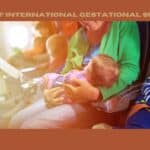The New York Times today has an article on Nepal’s ban on surrogacy, which went into effect last September. You may recall headlines and pictures post-earthquake of poor Nepalese women left stranded while gay couples from Israel took their babies out of the country.
Today’s headline is “Nepal Bans Surrogacy, Leaving Couples With Few Low-Cost Options,” and the article’s contents are all about the money.
The voices interviewed for the piece, except one lone critic who worried about poor women being taken advantage of, were among the usual suspects of pro-regulation voices parroting the talking points of pro-surrogacy advocates.
- “The problem with those agencies—some some of them of course are probably very good and careful—but anybody can do it. Basically what they do is they set up a website.” Lisa C. Ikemoto, professor of law at University of California, Davis.
- “The thing is, the kind of money that they get out of surrogacy is probably 10 years of their savings otherwise.” Dr. Sahil Gupta, surrogacy clinic manager.
- “For same-sex couples, it’s becoming increasingly difficult.” Andrew Vorzimer, reproductive attorney.
- “I’m very much in favor of less expensive options for people, but to date, there has not been a single place I’ve felt comfortable sending people to.” John Weltman, president/founder of Circle Surrogacy.
Saving people money, lifting poor women out of poverty by trading on their reproductive capacities, helping couples avoid pricey surrogacy arrangements in America, all the while ignoring the risks to women and to children.
Let me be clear: surrogacy in all its forms hurts women and hurts children.
Those in favor of regulation refuse to discuss the fact that using women and children in this way is simply incompatible with human dignity. It is a violation.
Bought, paid, purchased; part of the very definition of human trafficking—the trade of human beings. Join us in our efforts to #StopSurrogacyNow.
Author Profile

- Jennifer Lahl, MA, BSN, RN, is founder and president of The Center for Bioethics and Culture Network. Lahl couples her 25 years of experience as a pediatric critical care nurse, a hospital administrator, and a senior-level nursing manager with a deep passion to speak for those who have no voice. Lahl’s writings have appeared in various publications including Cambridge University Press, the San Francisco Chronicle, the Dallas Morning News, and the American Journal of Bioethics. As a field expert, she is routinely interviewed on radio and television including ABC, CBS, PBS, and NPR. She is also called upon to speak alongside lawmakers and members of the scientific community, even being invited to speak to members of the European Parliament in Brussels to address issues of egg trafficking; she has three times addressed the United Nations during the Commission on the Status of Women on egg and womb trafficking.
Latest entries
 infertilityApril 23, 2024The Rise of International Gestational Surrogacy in the U.S.
infertilityApril 23, 2024The Rise of International Gestational Surrogacy in the U.S. Assisted Reproductive TechnologyApril 16, 2024Founder Jennifer Lahl’s Speech on Surrogacy to the Casablanca Declaration
Assisted Reproductive TechnologyApril 16, 2024Founder Jennifer Lahl’s Speech on Surrogacy to the Casablanca Declaration #BigFertilityFebruary 27, 2024No, Alabama Didn’t Ban IVF
#BigFertilityFebruary 27, 2024No, Alabama Didn’t Ban IVF ArticleSeptember 25, 2023The Little Engine That Could
ArticleSeptember 25, 2023The Little Engine That Could


